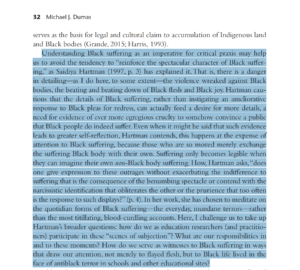I had to put down the article multiple times while reading it because I so deeply felt the pain behind each and every word. Dumas’ words not only educated and shared knowledge but also evoked a sadness and rage that he so incessantly calls out for. This passage in particular deems the MVP status, although every paragraph in this article could also attain it, because it made me recall many social media fights with so-called “devil’s advocates” who tried to justify violence, evil, and deliberate malignant action against Black people and then challenged me as an aspiring educator to materialize it in the real world and point blank confronted me as to what I would do about it. The issue here is that Black suffering, because of antiblackness, often times is met with people validating and defending the right to make Black people suffer. It’s hard enough being Black in an antiblack society, but to add on top the burden of having to constantly justify why you deserve basic humanity in light of deathly violence is incredibly difficult to go through every single day. But unfortunately, it’s not just about the larger violent incidents, it is also about the microagressions that Black and brown people face day in and day out and how that effects them as well.
I think that the questions posed in this paragraph must be asked because it’s not a matter of if we will encounter it in a classroom setting but when. Yes, please, call me out and hold me accountable because I will be the adult in the room, I will be responsible for my actions and for what I allow in my classroom. At first I thought that Dumas’ call to end schooling as we know it was slightly extreme but now, I think it’s the only possible way to move forward and against antiblackness.
